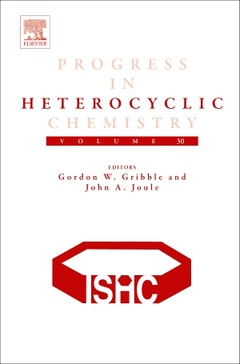Description
Progress in Heterocyclic Chemistry
Progress in Heterocyclic Chemistry Series
Coordinators: Gribble Gordon, Joule John A.
Language: English
Subject for Progress in Heterocyclic Chemistry:
Keywords
(Thio)Pyrans; 1; 2; 3-triazoles; 1; 2; 4-triazoles; 1; 2; 4-Trioxolanes; 1; 2-Dithioles; 1; 3-Dioxoles; 1; 3-Dithioles; 1; 3-Oxathioles; 2-Azetidinones (ß-lactams)2-Oxetanones (ß-lactones)Azetidines; acyl radicals; Allylsilanes; amidine; amine; Azacycles; Azaindole; Azepane; Azetines; azide; Aziridines; Azirines; Benzazepine; benzo[b]furans; benzo[c]furans; Benzodiazepine; Benzopyran derivatives; Benzothiazole; Carbazole; carbon monoxide; C-H functionalization; Chromones; Cinnolines; Coumarins; cross-coupling; Cycloadditions; cycloadditions; di- and tetrahydrofurans; Diazepine; Diazirines; Dioxanes; Dioxathiepine; Dioxazepane; Dioxepine; Dioxetanes; Dioxolanones; directing groups; Dithiazepane; Dithiepine; Dithiins; Dithiolanes; Epoxides; Four-membered silylenes; Furans; Fused nitrogen heterocycles; Heterocycles; Heteromacrocycles; High-nitrogen content heterocycles; imidazoles; imine; Indole; Indoxyl; Isatin; Isoindole; isoquinolines; Isothiazole; Isoxazole; Isoxazolidine; Isoxazoline; lactams; Macrocycles; metal-catalyzed; Natural products; nitrogen-philic cyclization; Oxacycles; Oxadiazepine; Oxadiazole; Oxathianes; Oxathiazepane; Oxathiazepine; Oxathiepine; Oxathiolanes; Oxazepane; Oxaziridines; Oxazole; Oxazolidine
618 p. · 15x22.8 cm · Paperback
Description
/li>Contents
/li>Readership
/li>Biography
/li>Comment
/li>
Progress in Heterocyclic Chemistry (PHC), Volume 30, the latest in this annual review series commissioned by the International Society of Heterocyclic Chemistry (ISHC), contains both highlights of the previous year?s literature on heterocyclic chemistry and articles on new and developing topics of interest. Chapters in this updated volume are all written by leading researchers in their field, providing a systematic survey of the important, original material reported in literature in 2017. As with previous volumes in the series, this update will enable academics, industrial chemists and advanced students to keep abreast of developments in heterocyclic chemistry in a convenient resource.
1. Cooperative Radical/Polar Annulation Methods for Nitrogen Heterocycles 2. The Silyl-Prins Reaction as an Emerging Method for the Synthesis of Heterocycles 3. Three-Membered Ring Systems 4. Four-Membered Ring Systems 5. Five-Membered Ring Systems: Pyrroles and Benzo Analogs 6. Five Membered Ring Systems: Furans and Benzofurans 7. Five-Membered Ring Systems: with More than One N Atom 8. Five-Membered Ring Systems: with N and S Atoms 9. Five-Membered Ring Systems: with O and S (Se, Te) Atoms 10. Five-Membered Ring Systems: with O and N Atoms 11. Six-Membered Ring Systems: Pyridines and Benzo Derivatives 12. Six-Membered Ring Systems: Diazines and Benzo Derivatives 13. Triazines, Tetrazines and Fused Ring Polyaza Systems 14. Six-Membered Ring Systems: with O and/or S Atoms 15. Seven-Membered Ring Systems 16. Eight-Membered and Larger Rings
The primary audience for this series includes Heterocyclic, Medicinal and Natural Product Chemists working in academia, Government laboratories, and industry. Given the wide breadth of heterocyclic chemistry, there is a vast secondary audience of scientists from other disciplines, including Organic and Analytical Chemists, Biochemists, Synthetic Chemists, Pharmaceutical Scientists and Chemical Engineers
Gordon Gribble is the Dartmouth Professor of Chemistry at Dartmouth College, Hanover, USA. His research program covers several areas of organic chemistry, most of which involve synthesis, including novel indole chemistry, triterpenoid synthesis, DNA intercalation, and new synthetic methodology. Prof. Gribble also has a deep interest in naturally occurring organohalogen compounds and in the chemistry of wine and wine making.
John Arthur Joule did his BSc, MSc, and PhD degrees at The University of Manchester, obtaining his PhD in 1961. He then undertook post-doctoral work at Princeton University and Stanford University, before joining the academic staff of the Chemistry Department at The University of Manchester in 1963, where he is currently a Professor. In 1996 he received an RSC Medal for Heterocyclic Chemistry.
- Recognized as the premiere review of heterocyclic chemistry
- Includes contributions from leading researchers in the field
- Provides a systematic survey of the important 2016 heterocyclic chemistry literature
- Presents articles on new and developing topics of interest to heterocyclic chemists
These books may interest you

Progress in Heterocyclic Chemistry 147.64 €

Progress in Heterocyclic Chemistry 242.37 €

Progress in Heterocyclic Chemistry 242.37 €

